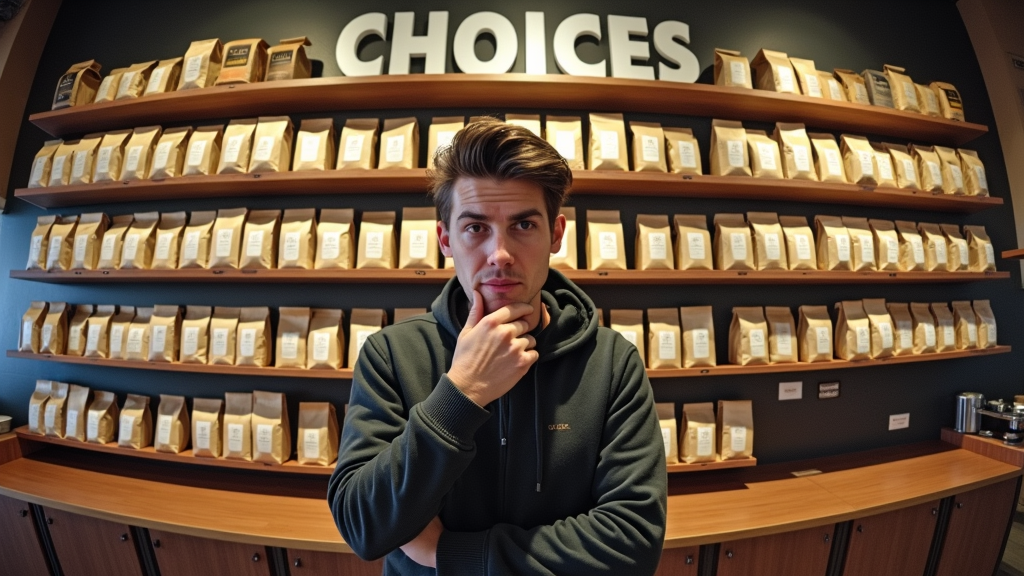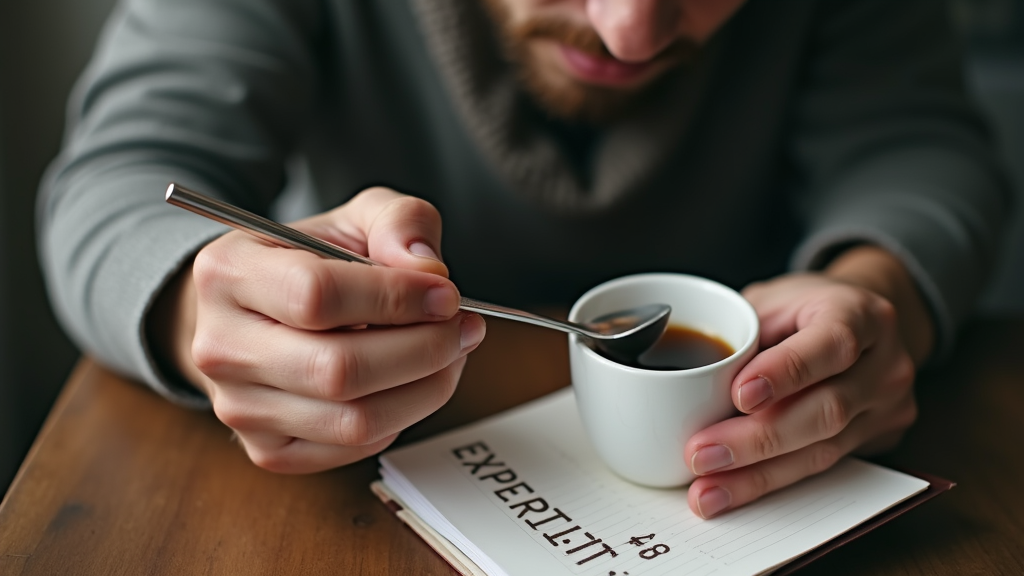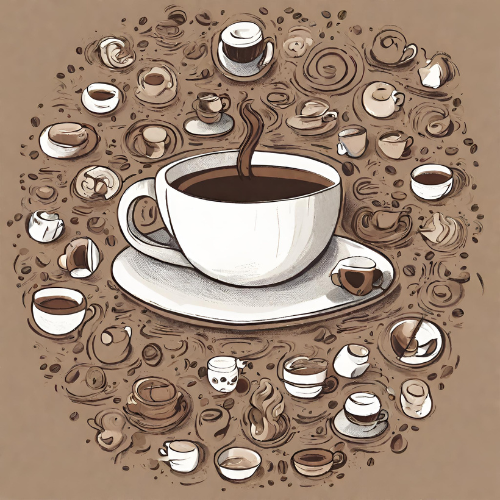
Introduction
Walking into a coffee shop or browsing online stores can feel overwhelming. You'll find countless coffee bags with different origins, roast levels, and flavor descriptions. Making sense of all these options while trying to find your perfect cup of coffee isn't easy. This is where coffee brand comparison and honest reviews become your helpful friends in making smart choices.
Reviews help clear up the confusion about coffee selection. They give you real information about taste, quality, and value that you won't find on the package label. By reading what other coffee lovers say, you can better understand if a coffee matches your taste preferences before buying it. Good reviews tell you exactly what to expect in your cup, from the first sip to the last drop.
Understanding Coffee Reviews
Coffee reviews help you find great coffee and avoid wasting money on beans you might not enjoy. These reviews come from coffee experts who taste and rate different coffees, sharing what makes each one special. You'll learn about flavors, aromas, and quality before buying, which helps you make better choices for your taste and budget.
Professional coffee tasters use specific methods to review coffee, while everyday coffee drinkers share their experiences online. Professional reviews often include coffee bean ratings based on factors like aroma, flavor, body, and aftertaste. Some reviews come from blind tastings, where experts don't know which coffee they're trying until after they rate it. This makes the reviews more honest and reliable.
- Better Shopping Decisions: Reviews tell you if a coffee matches your taste preferences before you buy
- Value for Money: You'll know which premium coffees are worth the extra cost
- Learn About Coffee: Reviews explain coffee terms and flavors in ways that are easy to understand
- Quality Assurance: Professional reviews help you identify high-quality beans
- Discover New Options: Reviews introduce you to coffee varieties you might not have tried before
- Understand Brewing Tips: Many reviews include advice about the best ways to prepare specific coffees
Professional Coffee Rating Systems
Coffee ratings help you understand the quality of beans before you buy them. Professional tasters use specific systems to score coffee based on things like flavor, aroma, and overall quality.
Here are the main rating systems you'll see when shopping for coffee:
-
Q Grading: Professional coffee tasters (Q Graders) score coffee from 0 to 100. Specialty coffee must score 80 or above. Q Graders test things like sweetness, acidity, and body.
-
Coffee Review's 100-Point Scale: Similar to wine ratings, this system looks at aroma, flavor, aftertaste, and body. Most specialty coffees score between 80 and 94 points.
-
Cup of Excellence: This is like the Olympics of coffee competitions. Judges rate coffees multiple times, and only the highest scoring ones (usually 86+ points) get the Cup of Excellence award.
These scores can guide your coffee purchases. Generally, coffees scoring above 80 points are considered high quality. The higher the score, the more complex and interesting the flavor will be. However, remember that taste is personal. A 95-point coffee might have unique flavors that not everyone enjoys, while an 82-point coffee could become your daily favorite.

Key Coffee Evaluation Criteria
Understanding how to review coffee helps you find your perfect cup. A good coffee tasting guide looks at specific qualities that make each coffee unique. Professional reviewers and regular coffee drinkers often notice different things about their coffee, but both views are valuable.
| Criteria | Professional Review | Consumer Review |
|---|---|---|
| Aroma | Notes specific scents (fruity, nutty, floral) | How good the coffee smells |
| Flavor | Identifies taste layers and origin markers | Overall taste enjoyment |
| Body | Analyzes texture and mouth feel | How light or heavy the coffee feels |
| Acidity | Measures brightness and fruit-like qualities | Whether it tastes sharp or smooth |
| Aftertaste | Evaluates lasting flavor complexity | If the taste stays pleasant |
These qualities work together to create your coffee experience. When you read coffee reviews, you'll notice scores usually reflect how well these elements blend. A great coffee balances all these features without letting any single quality overpower the others. While professionals might give detailed scores for each aspect, what matters most is finding coffee that matches your taste preferences.
Coffee Cupping Process
Professional coffee tasting follows a specific method called cupping. This process helps you understand the unique qualities of different coffees. Coffee experts use this method to rate coffee beans consistently, just like wine tasting but for coffee.
1. Grinding the Beans
Fresh coffee beans are ground to a coarse size right before tasting. The grounds are placed in small cups for evaluation.
2. Checking Dry Aroma
You'll smell the dry coffee grounds first. This gives you the first hints about the coffee's character and quality.
3. Adding Hot Water
Water at about 200°F is poured over the grounds. Let the coffee steep without stirring.
4. Breaking the Crust
After 3 to 5 minutes, use a spoon to break through the layer of grounds floating on top. This releases intense aromas that tell you more about the coffee.
5. Tasting the Coffee
Using a special spoon, you'll slurp the coffee to spread it across your tongue. This helps you taste all the flavors and feel the coffee's body.
This careful process makes sure every coffee gets a fair review. When you read our coffee reviews, you'll know they come from this same thorough method every time. This helps you make better choices about which coffees you might enjoy.
Reading Coffee Review Terminology
Coffee reviews often use specific words to describe flavor notes and qualities. You'll see these terms in coffee shop menus and on coffee bags. While they might seem fancy at first, they're actually simple ways to describe what you taste in your cup.
- Acidity: The bright, crisp sensation you feel, like biting into an apple
- Body: How heavy the coffee feels in your mouth, from light like tea to thick like syrup
- Aroma: The smell of coffee before you drink it
- Notes: The different flavors you can taste, such as chocolate or fruit
- Finish: The taste that stays in your mouth after swallowing
- Clean: A coffee without any odd or unpleasant flavors
- Balance: When no single flavor stands out too much
- Crema: The light brown foam on top of espresso
When you read about flavor notes like "hints of chocolate" or "berry sweetness," think of them as memories of familiar tastes. You might not taste exact chocolate or berries, but instead get subtle reminders of these flavors. Start with finding one or two flavors you recognize, and build your tasting skills from there. Your ability to spot different coffee flavors will grow with each cup you try.
Finding Reliable Coffee Reviews
Good coffee reviews can help you discover new beans and brewing methods you'll love. You can spot trustworthy coffee reviews by looking for detailed descriptions of taste, aroma, and brewing methods. Reliable reviewers usually include information about where the coffee comes from and how it was roasted. They should also mention when they tasted the coffee and how they prepared it.
- Professional Coffee Publications:
- Coffee Review uses blind tasting methods and detailed scoring
- Perfect Daily Grind offers in-depth articles and reviews
- Barista Magazine features industry insights and coffee reviews
- Sprudge provides independent coffee news and reviews
Watch out for reviews that might be biased. Some warning signs include reviews that only say positive things, don't mention any drawbacks, or use vague descriptions. Look for reviews that include both pros and cons of the coffee. Good reviewers often buy their own coffee instead of receiving free samples, and they'll tell you if they got the coffee as a gift from the company. This helps you know you're getting honest opinions about the coffee you might want to try.

Using Reviews for Purchase Decisions
Coffee reviews can help you find your next favorite bean. Reading what other coffee lovers say about taste, aroma, and brewing methods gives you useful information before spending your money. Focus on reviews that describe specific flavor notes and brewing experiences rather than just general ratings.
1. Check the Roast Level
Look for reviews mentioning your preferred coffee roast types. If you enjoy light roasts with bright flavors, pay attention to reviews highlighting fruity or floral notes.
2. Compare Brewing Methods
Find reviews from people using your brewing equipment. A coffee might taste great in a French press but different in an espresso machine.
3. Note Flavor Descriptions
Match reviewer descriptions with flavors you enjoy. If you like chocolate notes, search for reviews mentioning cocoa or nutty characteristics.
4. Read Recent Reviews
Check the latest reviews since coffee quality can change between harvests. Recent feedback gives you the most accurate picture of what to expect.
The price of coffee doesn't always tell the whole story about its quality. Some excellent coffees are reasonably priced, while expensive ones might not match your taste preferences. Start with small bags when trying new coffee based on reviews. This lets you explore different options without wasting money on large quantities you might not enjoy.
Common Coffee Review Misconceptions
Many people think coffee reviews are just about personal taste, but there's more to them than that. Coffee reviews help you understand what to expect from different beans and roasts. They're useful tools for finding coffee you'll enjoy, even if you're new to specialty coffee.
- "All coffee reviews are subjective": While personal preference matters, professional reviews use standard criteria like aroma, acidity, and body to evaluate coffee.
- "Expensive coffee always gets better reviews": Price doesn't guarantee quality. Many affordable coffees receive excellent reviews based on their taste and quality.
- "You need to be an expert to understand coffee reviews": Reviews often use simple terms and descriptions that anyone can understand.
- "Single reviews tell the whole story": Looking at multiple reviews gives you a better picture of what to expect from a coffee.
- "All coffee reviewers use the same system": Different reviewers and websites might use various scoring systems or focus on different aspects of coffee.
Reviews can't tell you everything about a coffee. Your brewing method, water quality, and personal taste still play big roles in how much you'll enjoy any coffee. Think of reviews as helpful guides rather than absolute rules. They point you in the right direction, but your own experience with the coffee matters most.
Starting Your Own Coffee Reviews
Learning to review coffee helps you understand what you like and why you like it. As you try different coffees, you'll naturally pick up coffee brewing tips and start noticing subtle flavors. Your morning cup becomes more interesting when you pay attention to its taste, smell, and how it makes you feel.
1. Get Your Basic Tools Ready
You need a clean palate and a quiet space. Keep water nearby to clear your taste buds between sips. Have a notebook or phone ready to write down your thoughts.
2. Look at Your Coffee
Write down what you notice about the beans. Are they light or dark? Do they look shiny or dry? The appearance can tell you about the roast level.
3. Smell the Coffee
Take three short sniffs of the ground coffee. Write down what comes to mind first. Maybe you smell chocolate, nuts, or fruit.
4. Taste and Think
Take a sip and let it coat your tongue. Think about what you taste first, in the middle, and after you swallow. Notice if it's sweet, bitter, or sour.
5. Rate Your Experience
Give the coffee a simple score from 1 to 5. Write down if you would buy it again and why.
Writing down your coffee reviews helps you remember what you've tried and what you enjoyed. You can keep your notes private or share them online with other coffee lovers. Many people enjoy posting their reviews on social media or coffee apps. Your experiences might help others find their next favorite coffee.
Beyond Professional Reviews
Professional coffee reviews give you good information about coffee quality, but your personal taste matters more. What coffee experts love might not be what you enjoy. Think of coffee reviews as friendly suggestions rather than strict rules to follow.
Getting to know your coffee preferences is like discovering your favorite music. You might start with something familiar, but as you try different options, you'll learn what you truly enjoy. Some days you might want something bold and rich, while other times you might prefer something light and fruity.
Trying new coffees helps you understand what you like best. You might find that you love coffee from Guatemala but not from Kenya, or that you prefer light roasts over dark ones. Each new coffee you try teaches you something about your taste preferences.
Find Me A Coffee uses your mood and preferences to suggest coffees you'll probably enjoy. Instead of only looking at expert reviews, we consider how you feel and what you usually like. This helps you find coffees that match your taste, whether you want something comforting on a cold morning or energizing for a busy day.
Conclusion
Coffee reviews give you valuable information about taste, quality, and value before you buy. Reading reviews helps you find coffees you'll enjoy and avoid spending money on ones you won't like. Understanding what other coffee drinkers experience lets you make better choices for your morning cup.
You can start using coffee reviews today to improve your coffee experience. Look for reviews that match your taste preferences and budget. As you read more reviews, you'll learn the coffee terms and flavors that matter most to you. Soon you'll be picking out great coffees with confidence and enjoying every cup more than the last.
FAQ
What makes a coffee review trustworthy?
A trustworthy coffee review includes clear tasting notes, brewing method details, and roast date information. Look for reviews that mention specific flavor characteristics and avoid vague descriptions. The reviewer should explain their expertise and use standard coffee tasting terminology.
How important are numerical ratings?
Numerical ratings help you compare coffees quickly, but they shouldn't be your only deciding factor. Focus more on the detailed descriptions and tasting notes. Different reviewers might use different rating scales, so reading the full review gives you better insight into the coffee's quality.
Can I trust online consumer reviews?
Online consumer reviews can be helpful when you read them carefully. Look for detailed reviews that describe specific experiences with the coffee. Pay attention to reviews that mention brewing methods and taste preferences similar to yours. Be cautious of very short reviews or ones that seem overly positive or negative.
What's the difference between specialty and commercial coffee reviews?
Specialty coffee reviews focus on single-origin beans, specific processing methods, and detailed flavor profiles. They often include information about the farm and harvest. Commercial coffee reviews typically cover widely available brands and blends, focusing on consistency and general taste preferences.
How often should I check coffee reviews?
Check reviews whenever you want to try new coffee or when your favorite roaster releases seasonal offerings. Coffee harvests change throughout the year, affecting taste and quality. Most specialty roasters update their offerings every few months, making it worth reviewing regularly.
Do coffee reviews account for different brewing methods?
Good coffee reviews mention specific brewing methods used during tasting. Some coffees perform better with certain brewing methods. For example, a coffee might taste great as espresso but average when used in a French press. Look for reviews that match your preferred brewing method to get the most relevant information.
